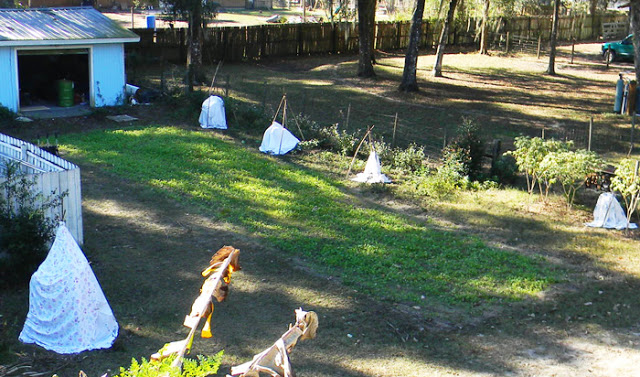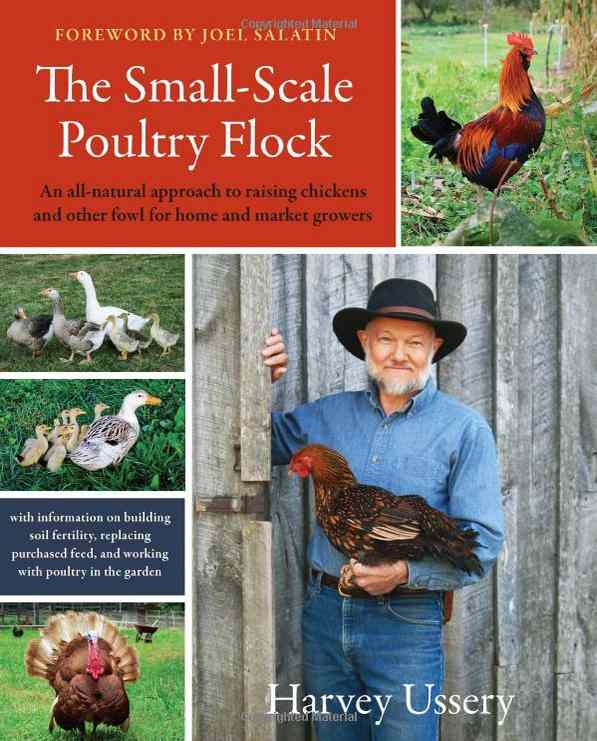Year-round cover crops in Florida make sense if you’re building up an area for a food forest or future garden plot. It’s easy here!
I recently came across this article by the always-helpful Harvey Ussery at Mother Earth News.
Harvey is the author of this book, which I highly recommend for anyone interested in raising chickens:
Chickens aside, I’m a big fan of cover crops, though I don’t always use them the way others do. I use perennials and annuals, depending on the location – and rather than tilling everything under, I often chop plants down as mulch, then put them around mulch-loving perennials or the next season’s crops.
Year Round Cover Crop Suggestions
In an annual setting, say you want to grow peppers in the spring. In fall, you might plant a mix of lentils, ryegrass, mustard, turnips, chickpeas, garlic, peas, fava beans, and other cool-season crops. When the weather is warm enough for peppers, harvest whatever you like of those plants, then start chopping holes into the green mess and planting your peppers. As the cool-season crops fade, they’re still protecting the ground from erosion and the baking heat of the sun. Some may be adding nitrogen, and others (like mustard) are deterring pests. Some might just be good for adding humus to the soil (like rye, with its massive root system), whereas still others are good food for the table.

It’s too cold for baby citrus trees… but not too cold for turnips, peas, ryegrass and other cool-season soil-building cover crops
In the warm season, as you look forward to perhaps planting cabbages or broccoli in the fall… plant cover crops such as beans, buckwheat, sunflowers, marigolds, pigeon peas, etc. The more varieties, the better. I’m all about intercropping.
Right now, I’ve got a large patch of cool-season cover plants (see above!) going that will be converted to corn in the spring. It’s not only good for your soil – it’s a great use of space that might otherwise be vacant. There’s no excuse not to garden year-round here!
Anyone else experimenting with cover crops? Any good suggestions I missed?



13 comments
I planted 25 lbs of Crimson Clover cover crop on our entire acre in late fall/early Winter (around December). I did so with the hope I could get improved soil, and frankly, I love clover lawns. We were supposed to get a "cooler, wetter" than normal winter so it hasn't done very well…far too dry and it's only just making it in a few isolated spots. It's my 2nd year trying to get this clover thing going…frustrating :)
You have my sympathy. Clover used to grow wonderfully for me up in TN… but I rarely see it doing well here. From my reading, quite a few of the clovers are more Northern cover crops. That makes sense, since they like a rainy spring.
Here I have "black medic" growing in the yard that's a local self-seeding nitrogen fixer. I wonder if that might work better for you? It's not as pretty, but it definitely likes Florida weather.
Clover has been an abject failure for me here in southern Arizona so far, even the allegedly desert adapted varieties like nitro and palestine. Vetch (Lana woolypod vetch specifically), on the other hand has been a smashing success. In areas that I have planted it previously, it vigorously sprouts in the late summer/early fall and gives me a free cover crop for winter/spring.
It's good that you experimented. I've told people in the past to just keep their eyes open and do plenty of tests… that way you'll find something that works.
BTW, speaking of nitrogen fixers, do you happen to have mesquite trees growing on or near your property? I've been trying to get seeds for a food forest project and it's been a pain. Sources keep falling through.
I do. I am on the edge of the riparian mesquite bosque zone down here near the valley bottom. I get bazillions of pods in summer and fall. They might be hard to come by now, as critters eat them for food. The inner seed envelope usually comes through the process intact however and…I'm trying to remember where I last saw a pile of seed envelopes piled by some rodent or another…
The trees are the common velvet mesquite that is ubiquitous down here.
Nice! I tried to get some from the USDA seed bank and they switched my order, telling me mesquites were "too weedy."
Other sources say they won't grow here at all. I'm going to try.
Can I trade you some cassava canes, tobaccos seeds or something else for a fistful of seeds? If you can find any, that is.
(BTW, the mesquite beans are edible for us as well – dunno if you're using them for that or not.)
I tried grinding the pods in my grain mill. They made a sticky mess. Too much sugar in the pods to do that. The local hippies have a hammermill that they fire up a couple times a year for people to bring their pods to be ground into mesquite flour. I would have to gather, store and then transport the pods for grinding.
I tried breaking up the pods in various ways and boiling them to get at the pod pulp. I had some success with that. After the seed envelopes are strained out, the remaining porridge could be thickened by boiling down and eaten as a survival food. I thought about trying to see if I could make some sort of mesquite syrup by condensing it further, but never got to that experiment.
I'd really like to find a way to process the pods for chicken feed. I have an old shredder, hammermill style (not the same as the hammermills made for grinding pods though), and was brainstorming a way to adapt it to grind the pods down to particles less than 1/4", and see if the chickens can be persuaded to try them. Another project pending…
Right now the beans that we do gather get raked up and composted for the gardens.
What is cassava, how does it grow, and what is it good for?
I'm at the farm for the weekend now. I'll keep my eyes peeled for stray pods or seed envelopes.
Cassava is an amazing staple root crop from S. America – tough stuff and takes low water well. I wrote a bit on it here:
http://www.floridasurvivalgardening.com/2012/09/survival-plant-profile-cassava-king-of.html
I wonder if perhaps the pods can be hammered in a large mortar/pestle setup? And I also wonder if they're dried thoroughly if they'd grind better. Hmm. I've never had a chance to mess with them. I do envy the desert, though – I went out there a few years ago to meet clients in Phoenix and was simply blown away by the wonderful weirdness of everything.
Regarding experimenting, 100%. I tell people that if they think their can of "survival seeds" from World Net Daily is going to save them in a pinch, they may be in for a world of hurt. Gardening is not the same in any two areas, and the varieties that work in Iowa or Pennsylvania will probably fail in Florida or Arizona. Same with the gardening techniques. You simply must experiment in advance to find a set of techniques and seed varieties that have a prayer of sustaining your life where you're at.
That, and of course networking with other people doing the same. My mother has an informal garden club with several other elderly ladies in the valley here, wherein they swap successes and failures. There are even significant differences between here and Tucson. Same latitude and elevation, different topography and soil, different gardening results.
I saw you at Vox's place a while ago, added you to my sidebar, because you're doing the same thing as me, albeit in a different climate.
You're totally right. Now is the time to learn to grow food as well as ID your local edibles. Getting a really good feel for your area and what it produces is key. And also knowing when rain falls and doesn't fall… when freezes generally come and go, etc. Glad you found me. If you ever post any of your experiments, let me know and I'll link to them.
What would be a quick cover crop appropriate for Florida in August? Anything that could be grown and killed in 2-3 weeks? I know, tall order.
Southern peas or mung beans. You can usually get both from the bulk bins at a While Foods or other organic market. Those always sprout for me. Plus they fix nitrogen. WIN
Hey David – I am in South Florida, Collier County. I am redoing my garden, building new raised 8×4 beds, 20 of them. I have half done and wanted to get cover crops in them so as to prevent weeds, and fix the soil and provide green chop and drop. What would be best to plant? I have hairy vetch, maxum field peas, clover, buckwheat, sun hemp, sweet clover, sorghum, alfalfa, and crimson clover.
Comments are closed.